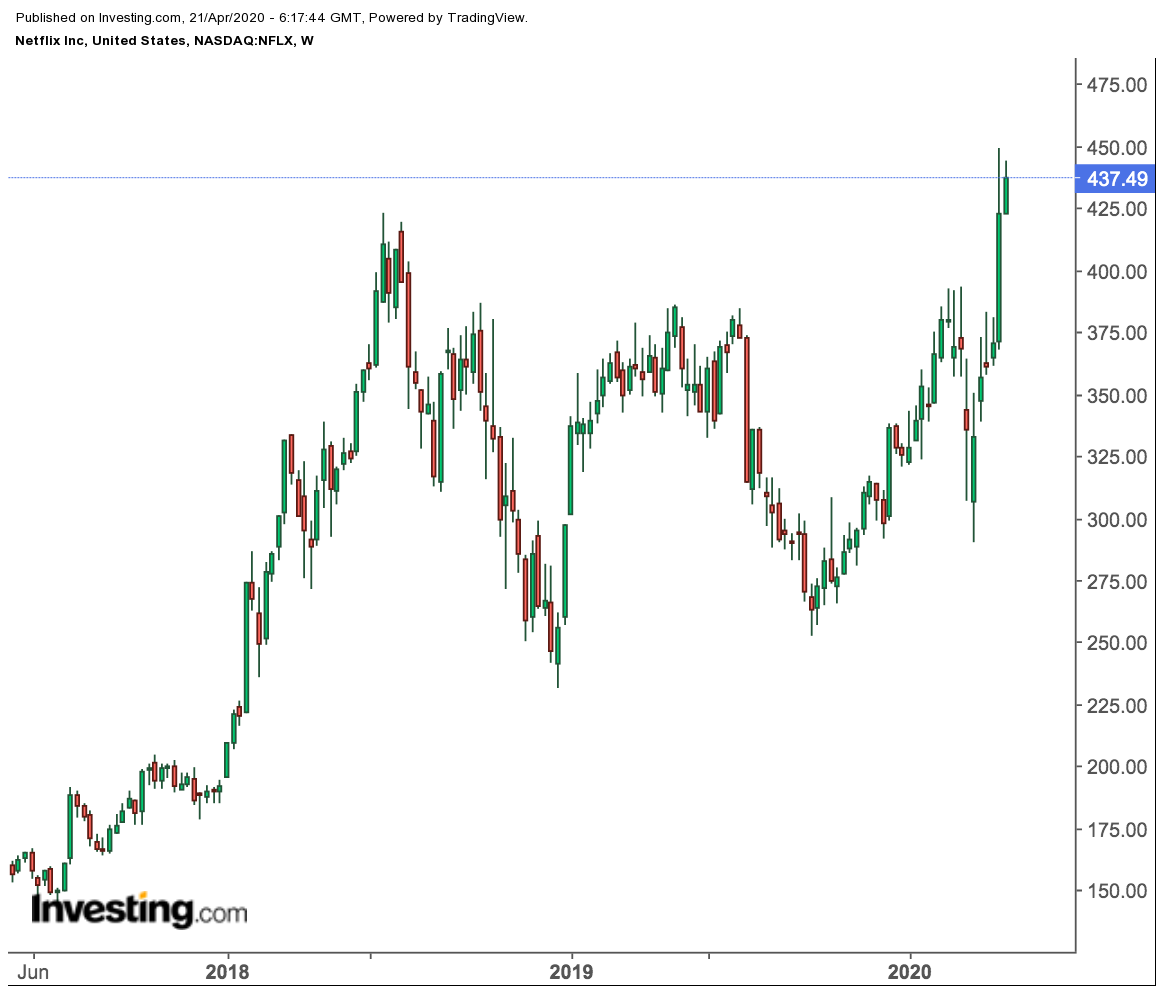* Reports Q1 2020 results on Tuesday, April 21, after the market close
* Revenue Expectation: $5.74 billion
* EPS Expectation: $1.63
Netflix (NASDAQ:NFLX) is one of the happy few stocks that's continued to reward investors. Shares of the streaming entertainment giant are still rising even through the precarious conditions currently slamming the market.
However, the sustainability of that rally is very much dependent on the company's latest earnings, scheduled to be released later today.
The Los Gatos, Calif.-based company has been the best performing name among the FAANGs, the group of five mega cap tech stocks that includes Apple (NASDAQ:AAPL) and Amazon (NASDAQ:AMZN). These stocks were among the biggest contributors to the market’s rebound after it fell into a bear market in March.
Netflix's shares are up 36% this year, while the S&P 500 is down about 12%. And, despite tumbling 3.7% on Friday in its first losses after four straight days of gains, the stock recouped most of that yesterday, jumping 3.4% to close at $437.49.
The story that’s fueling the momentum in Netflix shares is quite straightforward: the company’s global reach should help to add more customers at a time when people all over the world are spending more time on their screens because of the social distancing measures adopted to combat the coronavirus pandemic.
Netflix's "stay-at-home" appeal means it actually benefits from the extraordinary lockdown circumstances that have shuttered most other forms of entertainment, making it both one of the best mega caps and tech stocks in which to take a position during this time of uncertainty.
Netflix and COVID-19
For some analysts, however, that logic doesn’t carry much weight. According to independent investment banking and asset management firm Needham, the virus could actually hurt Netflix whose streaming services should be in the “luxury” bracket at a time when paychecks, due to massive unemployment, are gone.
“NFLX charges a fixed amount per month and does not benefit economically from additional viewing hours by its subscribers,” analyst Laura Martin said in a recent note to clients.
However, in our view, the above is a somewhat short-term perspective that doesn't factor in other positive catalysts for the stock. For example, it's likely to take much longer for new entrants in the video-streaming market to meaningfully hurt Netflix's leading position if we go through a serious and prolonged recession.
That's because it will become harder for Netflix's biggest rivals to spend aggressively and expand their market share as the appetite for additional entertainment services diminishes when people start losing their jobs.
Key competitors Disney (NYSE:DIS) and Apple both launched their own streaming services, Disney+ and Apple TV+, in November. Going forward, AT&T's (NYSE:T) WarnerMedia plans to launch HBO Max in May and Comcast's (NASDAQ:CMCSA) NBCUniversal will introduce its Peacock service in the U.S. on July 15.
In addition, though Netflix missed its forecast for U.S. subscriber growth for the third straight quarter when it released its Q4 earnings report in January, its overseas expansion continues unhindered. The company posted an increase of 8.3 million subscribers in overseas markets, more than the 7 million it had been expecting. It now has 167 million subscribers worldwide, including 60.4 million in the U.S.
Bottom Line
In the face of the current, grim economic outlook, many technology companies are likely to trim their growth forecasts and shrink their spending plans. In that potential scenario, Netflix could be the net beneficiary if its competitors delay their launches or find it tough to attract subscribers.
Growth in subscribers and the company’s forecast for this year will be the key factors in today’s report and should help explain whether the current rally in its stock is justified.
